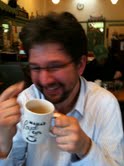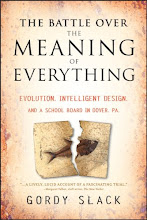 |
| UCLA brain lab examines free will. |
Whenever you are ready to, touch your index finger to the end of your nose. No hurry. Just do it when you want to.
Have you done it yet? No? That's fine. Take your time. But as soon as you're ready, touch your nose. Finished? Good.
If UCLA professor Itzhak Fried and his collaborators had just now been looking into your brain--through tiny super-sensitive electrodes that pick up firing signals from individual neurons--chances are pretty good that they could have predicted when you were going to touch your schnoz before the conscious "you" did. By as much as a full second and a half! Does this call into question the freedom of your will? I don't think so; for one thing, just because a decision is not conscious doesn't mean it's not "free." Even so, showing that awareness of a decision may only arrive sometime after an action has been initiated by other parts of the brain is interesting enough regardless of what it suggests about free will.
The experiment--published in the February 10, 2011, Neuron, and described by Daniela Schiller and David Carmel this week in Scientific American--went like this: Fried's team implanted electrodes into the brains of 12 epilepsy patients who were being prepared for surgery. The temporary implants were required to precisely pinpoint the areas where seizures were originating. But once in place, the researchers used the electrodes to watch individual neurons fire while asking the patients to press a button whenever they wanted to. The subjects were watching a hand sweeping around a clock face and would report to the researchers the exact time that they made the decision to push.
Not surprisingly, the experiment engaged a lot of neurons in the supplementary motor area, a part of the frontal lobe known to be involved in movement planning. More interesting is that many of these brain cells began firing in a way that predicted button pushing a full second and a half before the person reported having made a decision. At seven-tenths of a second, there was a crescendo of neural firing, enough to let Fried's group predict the timing of the coming action with 80 percent accuracy. Not bad.
Fried, who specializes in epilepsy surgery and neuroresearch, has long been looking at the brain for insights to questions otherwise locked in the realm of philosophy. His team identified the first human mirror neurons, sometimes described as the roots of empathy, and shed much light on the nature of memory, recognition, and other key issues. Once again patients with epilepsy, and the doctors who try to understand and help them, are pushing back the frontiers of neuroscience.


3 comments:
So the idea is that we know before we know... this is fascinating research in itself but I think there is also some connection between this sort of finding and an explanation for deja vu, isn't there? That we have been there before, but in our minds a few seconds earlier. Although it feels like it was another time and place.
MaoClare, That's an interesting suggestion. One explanation I've heard for deja vu, which is compatible with your idea, is that there is a slight delay between when one eye sees a thing and when the other does. The "first seeing" may create an uncanny feeling of recollection because still isn't fully processed before the second seeing is. Interestingly, there is a strong association between deja vu and temporal lobe epilepsy. TLE patients often experience a lot of deja vu, sometime during, sometimes after a seizure, and sometimes as an aura that comes just before a seizure hits. That all suggest maybe there is a part of the temporal lobe activated when we recognize something. If a seizure stimulates that part of the brain, we have a strong sense that we recognize the situation even though we don't. Maybe regular old deja vu is caused by a kind of sub-clinical seizure in that same part of the temporal lobe. That's my guess.
Another thought... the fact that your unconcious knows what you're going to do before your conscious is like a company board to make an executive decision behind the scenes and then inform the staff. It's still am expression of that company's freedom. There are always backroom dealings going on before action is taken.
Post a Comment